Dead 12-volt start battery In August of 2024, we got a panicked call from a friend whose car, a Tesla Model Y, was giving her real headaches. It turned out to have a dead 12-volt start battery. It needed a jump-start! A number of messages were being displayed in a seemingly random fashion on her …
Tag: Model X
Permanent link to this article: https://dashboardsymbols.com/2024/09/we-have-a-new-youtube-video-getting-in-a-tesla-that-has-a-dead-12-volt-start-battery/
Permanent link to this article: https://dashboardsymbols.com/2024/01/to-ev-or-not-to-ev/
Tesla Dashboard Symbols and Warning Lights
Tesla Symbols So, what is that light on your dashboard? What follows is easily the most complete list available of symbols and warnings that may appear in and on your car’s dashboard or instrument cluster. The following are warning lights, fault lights and indicators found in vehicles built by Tesla. Lacking an internal combustion engine, …
Permanent link to this article: https://dashboardsymbols.com/2020/10/tesla-warning-lights-and-symbols/
Tesla How to Videos: Help with Key Not Working
How to Open, Start and Replace Fob Batteries in Tesla Vehicles We have six videos for Tesla drivers with Help with Key Not Working This one will help you get inside if the 12-volt start battery dies. ………………………………………………………………………………………………………. Here is the process for getting into and getting going with a Model S. ………………………………………………………………………………………………………. This one …
Permanent link to this article: https://dashboardsymbols.com/2017/06/tesla-video-help-with-dead-key-fobs/
Start a Tesla with a Dead Key Fob or Mobile Phone
How to Start a Tesla with a Dead Key Fob or Mobile Phone Starting Your Tesla Model S or Model X First, if you are still locked out, click here for help getting inside! Second, for video help, click here! If a jump-start is needed — yes you can do that — click here! Finally, …
Permanent link to this article: https://dashboardsymbols.com/2017/06/tesla-model-s-and-model-x-dead-key-fob-help-part-ii/
Open a Tesla with a Dead Key Fob or Mobile Phone
How to Open a Tesla with a Dead Key Fob or Mobile Phone Getting into Your Tesla First, if you are already inside, click here for help getting started! Second, for video help, click here! Finally, if you need or want another manufacturer, click here. Model S, through 2020 There are now three back up …
Permanent link to this article: https://dashboardsymbols.com/2017/06/tesla-model-s-and-model-x-dead-key-fob-help-part-i/
Permanent link to this article: https://dashboardsymbols.com/2016/03/replacing-fob-remote-or-smart-key-batteries/



To EV or Not to EV…
Reasons NOT to buy an EV Debunked So we spotted a post on “X” recently titled “12 Reasons NOT to buy an EV” (electric vehicle), which leave internal combustion engine (ICE) powered cars as the only alternatives. We thought we’d have a look at it point by point. The 12 Reasons Each With a Counterpoint …
Continue reading